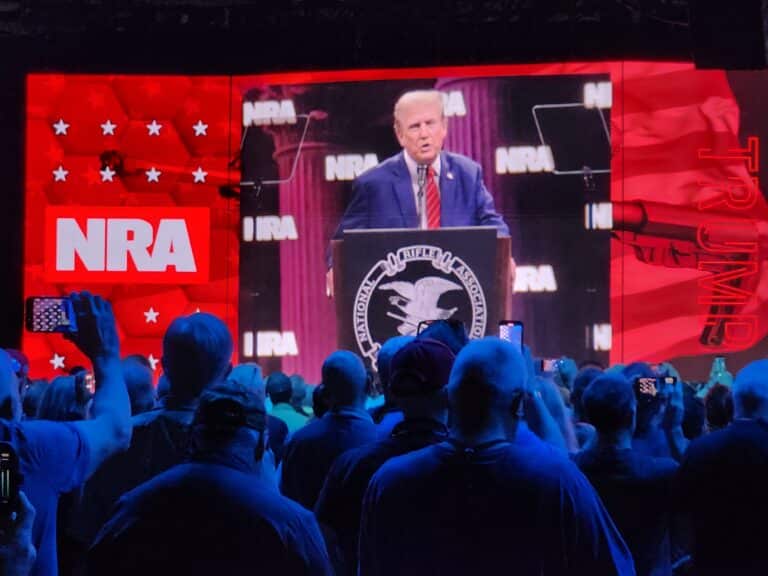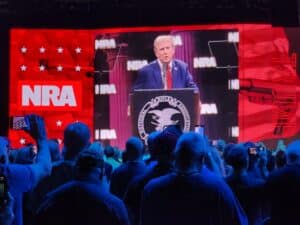Just days before the Republican National Convention opened up to officially nominate former president Donald Trump as its 2024 candidate for the same role, a 20-year-old Pennsylvania man shot him with an AR-15 in an assassination attempt that wounded his ear but left two others in critical condition and one rally attendee dead.
That event has the potential to create a seachange in gun politics and policy. After all, similar events have been the catalyst for most major American gun laws. And there have been some attempts to turn the shooting into a call for new gun control.
“An AR-15 was used in the shooting of Donald Trump,” President Joe Biden said on Tuesday, repeating a common theme of his re-election campaign that numerous gun-control groups echoed. “This was the assault weapon that killed so many others, including children. It’s time to outlaw them.”
But those calls have garnered little attention. Our gun politics appear surprisingly stable for now, but that may not last.
For one, assassinations and assassination attempts have previously led to major American gun control. The Gun Control Act of 1968 came after multiple high-profile assassinations of American political leaders, including President John F. Kennedy. The Brady Act is literally named after Ronald Reagan’s press secretary, who was severely injured during the 1981 attempt on his life.
Trump has a relatively uneven record on guns. It’s one that’s easily more pro-gun than his rival Joe Biden, who is running on the most aggressive gun-control platform in a generation. But it’s also one that features a number of caveats.
Perhaps most relevant is that he publicly called for an “assault weapons” ban in his 2000 book “The America We Deserve,” and he reportedly considered backing a ban on ARs after the El Paso Walmart shooting. And that was before somebody shot him with one.
But he also publicly considered supporting red flag laws after the Parkland shooting, infamously saying, “Take the guns first, go through due process second.” He did unilaterally implement a bump stock ban after the Las Vegas shooting, which the Supreme Court later ruled unlawful.
That’s in contrast with other parts of his record, of course. He appointed three of the six justices who ruled in favor of a landmark pro-gun ruling that set up a new standard for Second Amendment cases moving forward. They also ruled against his bump stock ban. He also signed the repeal of a late-era Obama regulation restricting guns for certain Social Security beneficiaries, designated gun businesses essential during the pandemic, and made a few other smaller pro-gun moves during his presidency.
He has also spoken to the National Rifle Association twice this year, with the group claiming he’ll do another event with them this season. Those speeches have included a myriad of gun-policy promises. He also launched Gun Owners for Trump at the NRA convention.
But that seems to have changed.
Republicans deleted gun-policy promises from their 2024 platform. The NRA wasn’t invited back to give a speaking slot at the RNC after having one in 2016. Trump gave the longest acceptance speech in history and didn’t mention gun policy a single time–not even the generic promise to protect the right to keep and bear arms featured in the platform. There were no gun-rights speakers at the RNC. The issue was relegated to an off-site event hosted by the United States Concealed Carry Association and a few comments in various speeches.
Most notably, JD Vance relayed an anecdote about how his family found 19 loaded guns in his grandmother’s home after her death. He said Republicans remain the party of people like her, who want to protect their family members. Like the Republican platform, that was a platitude rather than a specific policy promise.
But Vance also has a pro-gun record that’s likely to boost the ticket’s credentials among gun voters. As a 39-year-old elected to the Senate from Ohio in 2022, he doesn’t have a very long record. However, it is one that includes votes for a series of gun-rights bills and against a series of gun-control measures. He has also been about as rhetorically pro-gun as any politician during that time.
Still, Vance’s defining characteristic as a politician has been his willingness to bend and remake himself in Trump’s image. His initial rise to prominence was as a conservative author embraced largely by mainstream and left-leaning outlets over his portrayal of life in Appalachia. When Trump ran for president the first time around, he was deeply critical in public and even wondered privately whether he could be “America’s Hitler.” By 2020, like many other Republican holdouts, his tune changed dramatically.
Vance more or less owes his political career and its meteoric rise to Trump and his flip-flop on him. So, he would probably go along with Trump if he decided to change tact on the issue.
Not that it’s certain he will change tact by any means. All he and the party have done to this point is go quiet on gun policy. They haven’t actually announced or even teased any changes in their policy positions.
But it’s fair to say the issues moderated or dropped from the GOP platform, RNC speaking roles, and Trump’s acceptance speech are, at the very least, ones they’re not confident are helping them win re-election. Those are the areas they’re most likely to soften on if need be. It hasn’t happened yet with gun policy, but Trump is polling better than at this point in his previous two campaigns.
If and when the polls tighten, their tune on guns could change. It could be something less drastic than matching Biden’s call for an outright ban on the sale of AR-15s. They could go for red flag proposals or an AR ban specific to 18-to-20-year-olds.
Either way, if Trump is re-elected and pushes for new gun restrictions, he’s more likely to get them than if the same happens with Joe Biden. Trump can move Republicans on guns, or any other policy for that matter, better than Biden can. Democrats would, of course, be happy to go along for the ride.
Even if Trump never pushes for gun restrictions, that wouldn’t necessarily preclude some being passed as a result of his assassination attempt. The Brady Act didn’t pass until 1993, years after Reagan left office. So, while gun politics haven’t transformed in the few days since Trump was shot, they could change dramatically in the mid-to-long term.







4 Responses
Listened to podcast today. Regarding Trump’s comment about gun owners not voting, I got the impression you both find that a bit of an odd remark. I do too. Gun politics are probably the only reason why some people I know bother to vote.
I wonder if Trump, at NRAAM, heard somebody talking about the number of members voting in the NRA election (which is always abysmally low) and misunderstood the stat to be referring to national election participation. Best theory I’ve got.
To be fair to Trump, this is something I’ve heard gun-rights activists say from time to time. I’ve never really heard a good explanation for why this is a fairly common talking point. If anything, gun owners have a pretty strong reputation for voting based on firearms policy among most observers in political media.
The best I’ve heard it explained is that somewhere between 40 and 50 percent of the country has a gun in the home, but not all of them turn out to vote for the ostensibly pro-gun candidate in each election, or else that candidate would win basically every time. That’s not a very realistic view of things. But that’s how I’ve heard it told before. Not sure if the Trump Campaign has a more sophisticated view of the problem, though.
Simply owning a gun does not make someone a Second Amendment supporter. Like almost all other civil rights, few voters choose candidates based solely upon their fealty to gun rights. But a not insignificant minority does. Given the 50/50 nature of our national politics, there is probably no more sure way for Trump to lose this election than to turn on his Second Amendment supporters. Trump’s history disregarding the electoral consequences of his actions is at the root of speculation about how being shot might affect his administration’s gun control policies.
Yea, that’s how I look at it as well.